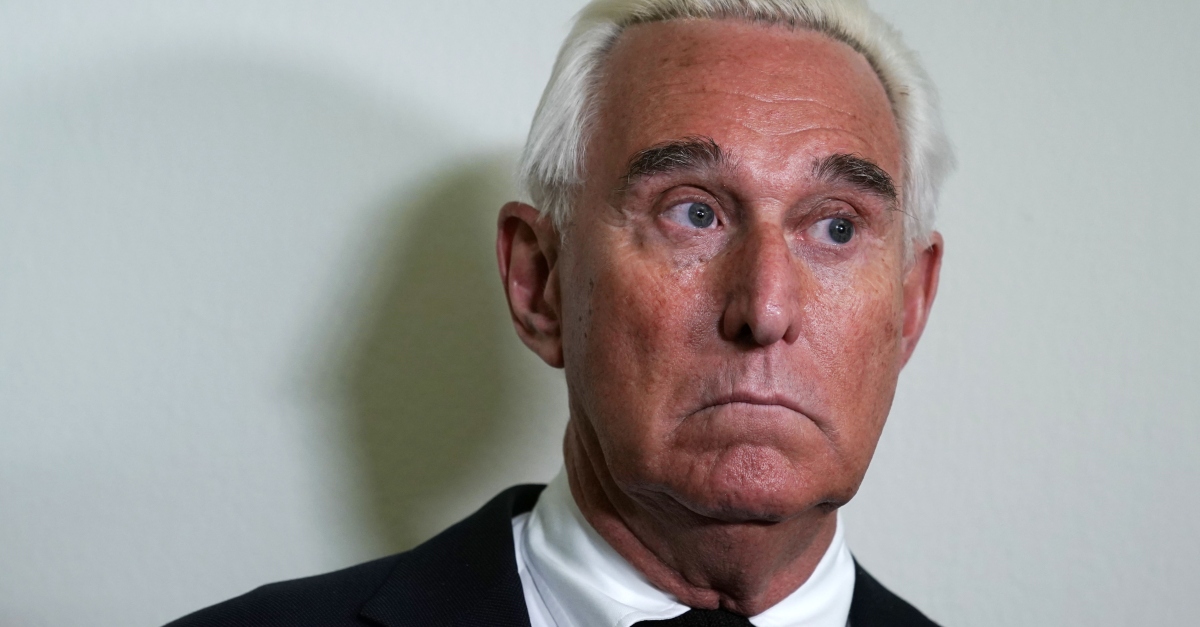
Most eyes in media were transfixed on day one of the public impeachment hearings being held in the U.S. House of Representatives on Wednesday. Meanwhile, less than a mile away across the national lawn, federal prosecutors were making their closing arguments in Roger Stone‘s trial on charges of obstruction, witness tampering and lying to federal investigators.
Those lies, the Department of Justice (DOJ) alleged, were all to benefit Stone’s longtime friend and ally: President Donald Trump.
“Roger Stone lied to the House Intelligence Committee because the truth looked bad,” said Assistant U.S. Attorney Aaron Zelinsky, formerly a member of Robert Mueller’s Special Counsel’s Office. “The truth looked bad for the Trump campaign and the truth looked bad for Donald Trump.”
Prosecutors claim that Stone lied during his September 2017 testimony before the House Permanent Select Committee on Intelligence. According to the indictment filed in January, Stone dissembled on five separate occasions about his possession of key emails and texts as well as his relationship with WikiLeaks and discussions with the transparency groups’s publisher Julian Assange.
“Stone testified falsely and misleadingly at [an Intelligence Committee] hearing in or around September 2017,” the indictment reads. “Stone failed to turn over and lied about the existence of responsive records to [congressional] requests about documents; Stone submitted and caused to be submitted a letter to [congressional investigators falsely and misleadingly describing communications with [Randy Credico]; and Stone attempted to have [Credico] testify falsely before [Congress] or prevent him from testifying.”
Such subterfuge, the DOJ alleged, prompted congressional investigators to issue an incomplete and inaccurate report about Russian interference in the 2016 U.S. presidential election. Assistant U.S. attorney Jonathan Kravis also made the point that Stone’s alleged lies kept important evidence out of investigators’ hands.
“Because Stone lied to them,” Kravis told the 14-person-strong jury, “the committee didn’t take that step and now those messages are gone.”
Additional digital documents are still extant and prosecutors relied on those texts and emails to make their case.
“Roger Stone did not want that information to see the light of day because it would have unraveled the other lies he told,” Zelinsky said.
“He knew that if the truth came out about what he had been doing in 2016, it would look terrible,” Kravis added.
Stone’s defense attorney Bruce Rogow tried to steer jurors in a different direction–focusing not on the technical aspects of his clients’ behavior, but the underlying value and legality of the information Stone allegedly lied about.
“There was no purpose for Mr. Stone to have to lie about anything to protect the [Trump 2016] campaign when the campaign was doing nothing wrong in being interested in this information,” Rogow said, in reference to WikiLeaks document dumps.
Rogow then posed an argument that agitated the prosecution:
So much of this case deals with that question that you need to ask, “So what?”
“So what? So what?” asked third chair government attorney Michael Marando. “If that’s the state of affairs that we’re in, I’m pretty shocked. Truth matters. Truth still matters. Okay? Mr. Stone came in and he lied to Congress, he obstructed their investigation and he tampered with a witness. And that matters and you don’t look at that and say, ‘So what?’ And for those reasons we ask you to find him guilty of the charged offenses.”
The jury will return on Thursday morning to be given their instructions and to deliberate Stone’s fate.
[Image via Alex Wong/Getty Images]